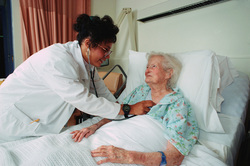
WHAT IS RESUSCITATION
Resuscitation is a medical intervention performed on a person whose heart has stopped beating or whose breathing has stopped. The process includes compression of the chest over the breastbone, the placement of a tube in the windpipe with artificial breathing, and electrical shocks to the body.
DOES RESUSCITATION WORK?
Resuscitation can be an effective life saving devise and is estimated to double a patient's chances of survival. As a result, many people know someone whose life has been saved by resuscitation. However, it is most effective on younger adult patients with certain types of heart problems and in response to complications from other medical interventions. Studies vary but only about 10% to 15% of people who receive resuscitation actually recover to be discharged from the hospital. And those rates drop to less than 5% for those who are elderly or who are already suffering from other major illnesses
WHY MIGHT A PERSON DECLINE RESUSCITATION?
Resuscitation is a major medical intervention. In the best of cases, patients can expect cracked ribs, possible internal bleeding, and a significant recovery period. For people who are older or already facing chronic or advanced medical problems these impacts can be much more severe. And although resuscitation can restore a heartbeat in up to 25% of such patients, very few survive long enough to be discharged from the hospital. Those that do typically suffer serious brain injury and may only recover enough to be discharged to a nursing home and remain on life support until death.
For patients who are already suffering unmanageable pain or face diminished quality of life, the pain and recovery of resuscitation may not be worth the suffering. Even elderly clients in good heath may choose to decline resuscitation out of concerns that, even if successful, the changes of their being on extended life support or living in a nursing home with major neurological damage is inconsistent with their choices about end of life. In such cases resuscitation may also be hard on the patients families as well. Declining resuscitation can be honestly thought of as letting the patient die a natural death without in anyway being the cause of it. Once resuscitation is performed and the patient is on life support machines and there is not open of their living without them, the family must make the choice to affirmatively end treatment which often feels very different.
Because resuscitation is such a common and significant choice, we encourage clients to give serious thought the circumstances in which they would or would not want to be resuscitated and to share those with others in an advanced health care directive. They should also appoint an agent they trust to carry out those choices. If they are already in a heath state where they would not want resuscitation, we can help them learn about tools to create a standing order to prevent resuscitation even outside a medical setting. To learn more about these choices and legal tools, contact us for a free consultation at [email protected] or (206) 459-1908.
 RSS Feed
RSS Feed